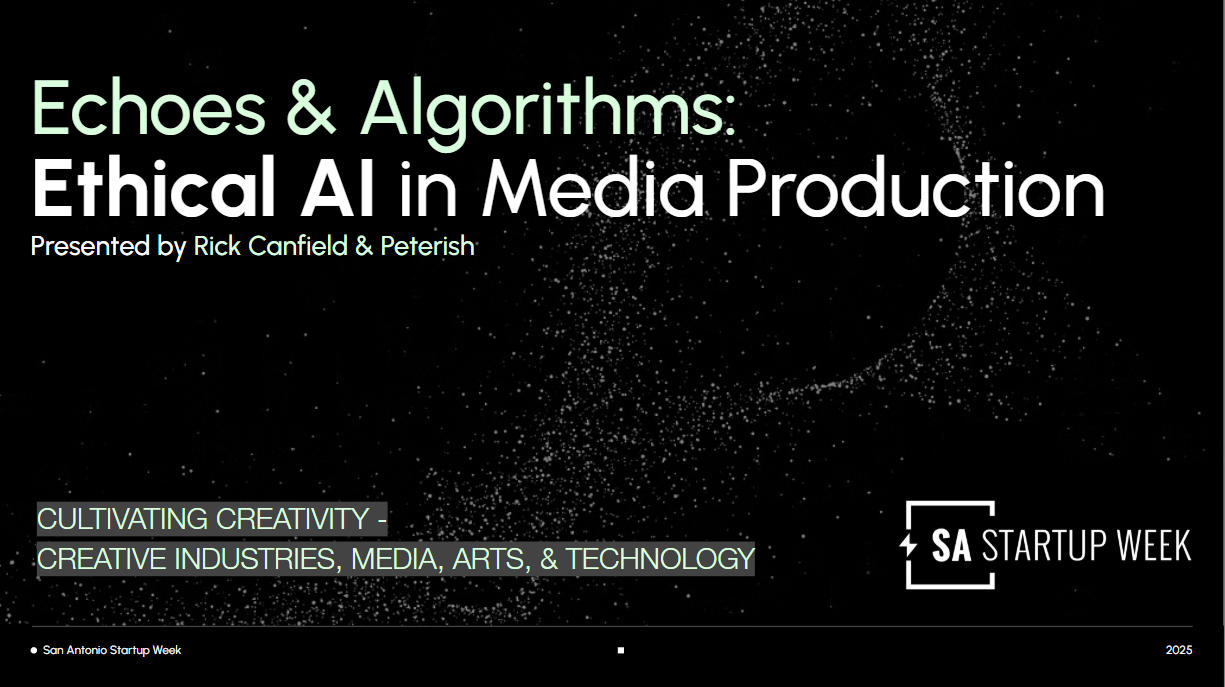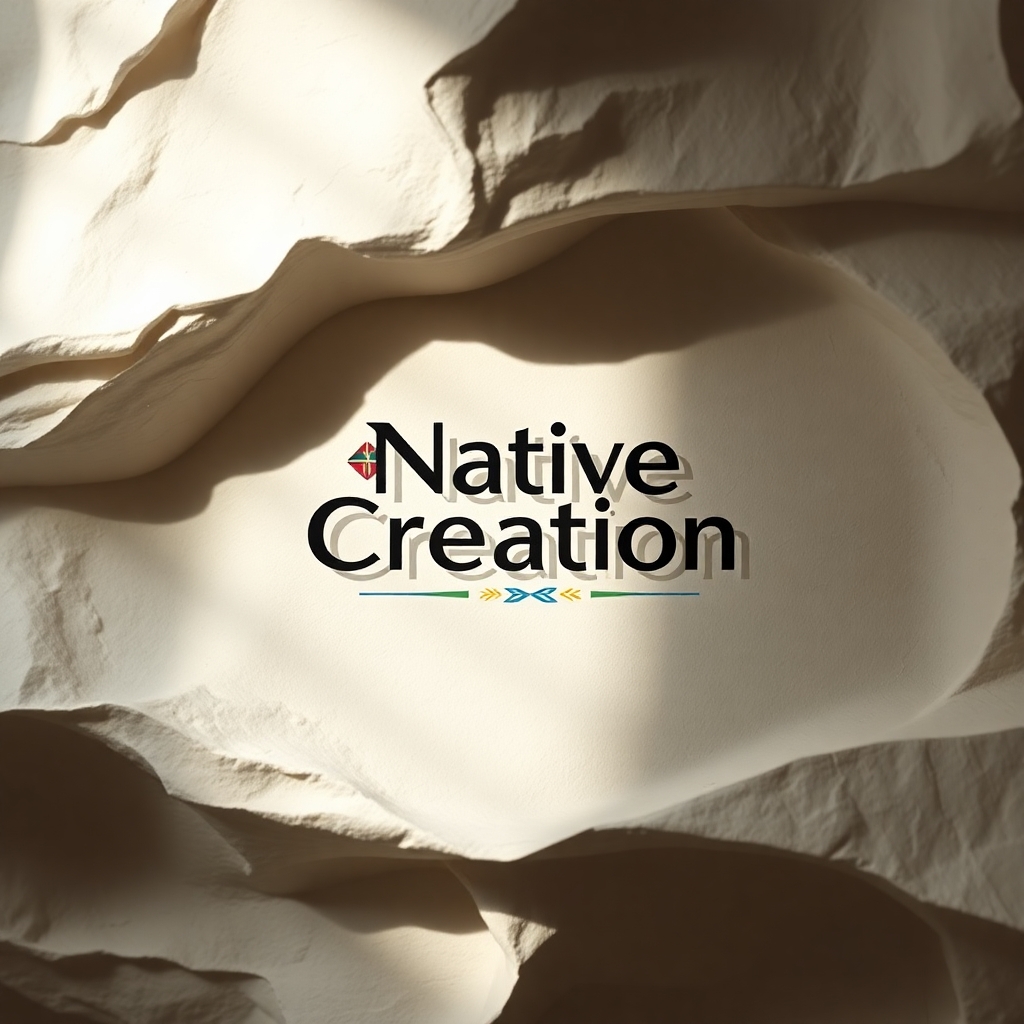Last week at the San Antonio Startup Week (SASW 2025), one of the main topics heard across various panels was about the integration of AI into our everyday lives. In that spirit, we hosted a compelling panel titled Echoes & Algorithms: Ethical AI in Media Production, which dived into the transformative yet challenging landscape of artificial intelligence in creative industries. The discussion featured industry experts such as myself, Rick Canfield (UESA) and Peterish (Gigaton), who explored how AI is reshaping film, TV, gaming, and commercial production while emphasizing the critical need for ethical considerations
Slideshow: Echoes & Algorithms: Ethical AI in Media Production
From Deep Roots to Digital Caves: The Core Theme
The theme for this year’s Startup Week was “From Deep Roots,” beautifully connecting Texas’ ancient storytelling traditions with the evolution of modern AI. As highlighted in the presentation, Texas’ unique anthropological history, including the 4,000 to 6,000-year-old Pecos Rock Art in West Texas (and showcased in an exhibit at the Witte Museum), serve as a poignant anthropological metaphor. These ancient pictographs, designed to “animate” with torchlight, echoed the idea of creators as “digital shamans” illuminating pixels on a digital “cave wall” with AI—a new medium for the ancient art of visual storytelling.
Defining Ethical AI and Media Ethics
The core of the discussion began by defining Ethical AI, emphasizing principles like human oversight, transparency, and bias mitigation, drawing inspiration from Dr. Casey Fiesler’s “AI Ethics” syllabus. I underscored the importance of Cultural Intelligence (CQ) and Emotional Intelligence (EQ) in bridging the gap between AI’s technical efficiency and the nuanced realities of human culture and emotion, especially in preventing harmful outputs like deepfakes. With the advancement of realistic artificial intelligence, cultural and emotional intelligence remain some of the key differentiators in identifying and producing ethical content.
Media ethics were also explored through the lenses of Consequentialism (Utilitarianism and Ethical Altruism) and Deontology (duty-based principles like truth-telling and respect for privacy). This theoretical framework provided a solid foundation for understanding the ethical dilemmas arising from AI’s integration into creative processes. Yet it also highlighted the ethical frameworks that already exist for ethics and media.
The Complexities of Copyright and Ownership
A significant portion of the panel addressed the intricate issues of copyright and ownership in the age of generative AI. Key dilemmas discussed included:
- Ethical Dilemma of Training Data (Input): AI systems are often trained on vast datasets containing copyrighted works without explicit permission or compensation for original creators.
- Ethical Dilemma of Authorship (Output): The U.S. Copyright Office generally requires human authorship for copyright protection, making AI-generated content a grey area unless there’s significant human creative input.
- Ethical Dilemma of Likeness and Identity (Deepfakes): The ability of AI to create realistic digital replicas of individuals without consent raises profound personal rights issues.
The panel offered potential solutions, including new licensing and compensation models (like Nightshade for artists), human input disclosure for copyright protection, and collective rights action through unions. The role of Creative Commons licenses was also highlighted as a “some rights reserved” approach, particularly for AI-produced content on free tiers.
AI Use Cases: Augmenting Creativity
Beyond the ethical considerations, the panel showcased practical and effective use cases of AI in media production. Examples included:
- Character Design: Leveraging tools like Leonardo.AI for input and Veo 3 for output demonstrated AI’s power in rapid visual concepting.
- Level Design: Combining different AI models to quickly generate level and game design examples.
- Time to Screen: Illustrating how AI dramatically reduces the time from concept to final product, such as converting 2D designs to 3D with tools like Meshy 6.
These examples emphasized that AI, when used ethically, can be a powerful tool to augment human creativity and streamline production workflows.
Key Takeaways for an Ethical Future
The panel concluded with crucial takeaways for fostering an ethical AI future in media production:
- Promote Local and On-Device AI: Encouraging AI models that run locally enhances privacy and gives creators more control.
- Empower Content Creators with Data Control: Implementing clear consent, data exclusion, and transparent reporting mechanisms for training data.
- Ensure Fair Compensation and Attribution: Developing systems for equitable compensation and proper attribution for content used in AI training.
- Foster Open-Source and Explainable AI: Supporting transparent AI models to help creators understand and align with ethical standards.
- Educate Creators: Providing accessible training on AI ethics and best practices for media professionals.
“Echoes & Algorithms” was a truly engaging dialogue, encouraging all attendees—creators, marketers, and technologists—to actively participate in shaping an AI future that amplifies human creativity and preserves our cultural integrity. The discussion made it clear that while AI offers unprecedented opportunities, a collective responsibility is needed to guide its development toward ethical and human-centric outcomes.
Slideshow: Echoes & Algorithms: Ethical AI in Media Production
- Echoes & Algorithms: Ethical AI in Media Production - October 28, 2025
- Creativity and AI Ethics: An Essential Toolkit for Game Dev Success - August 1, 2025
- Echoes on the Canyon Walls: Why the Pecos Rock Art is North America’s Oldest Grand Media - May 1, 2025




